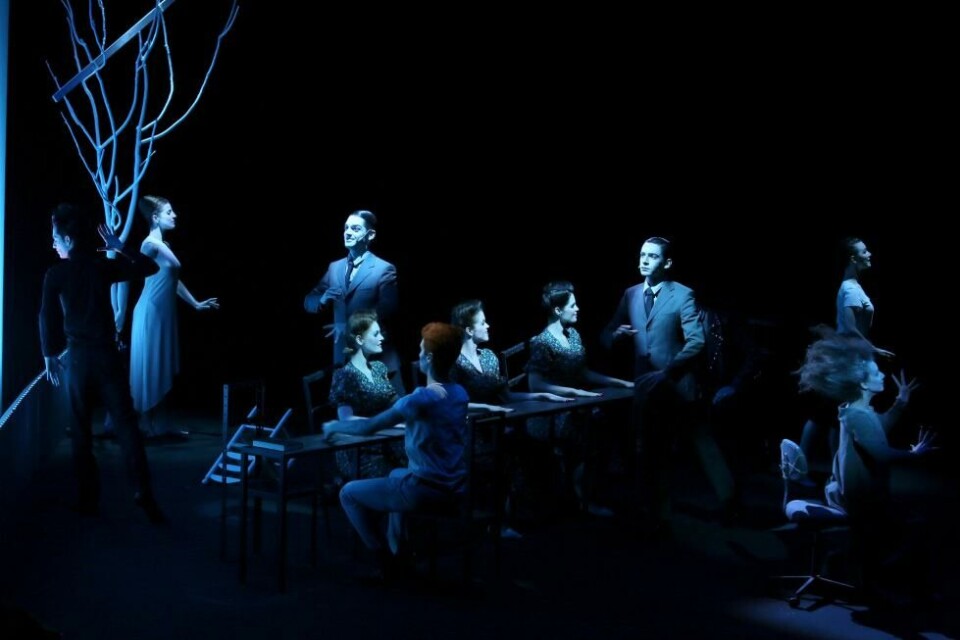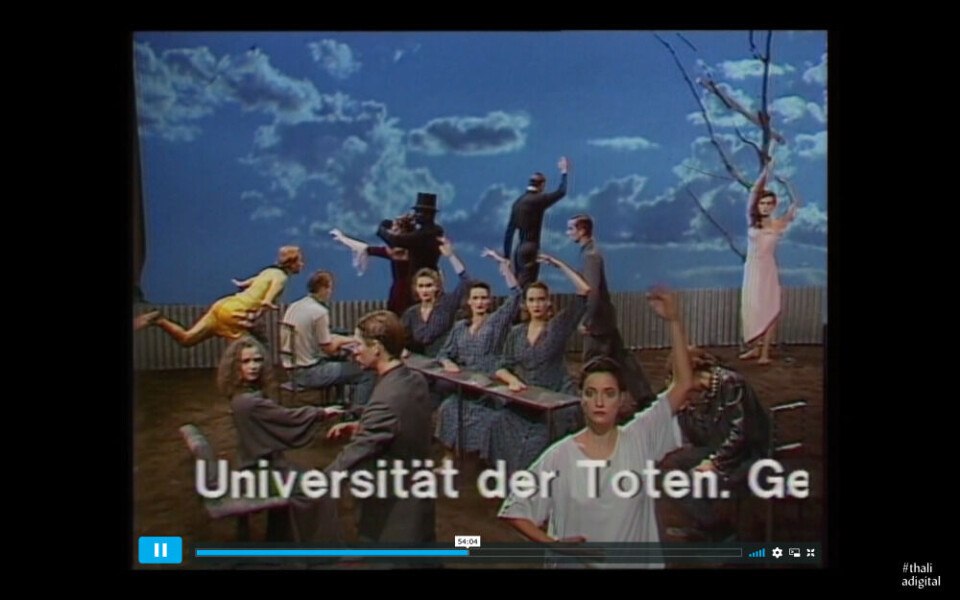
Wilsonesque estrangement
Heiner Müller’s «Hamletmaschine», directed by Robert Wilson, Thalia Theater Hamburg (1986). Streamed on Sunday 31. of May and Monday 1. of June.
Robert Wilson’s Hamburg production of Hamletmaschine is certainly the most famous stage version of Heiner Müller’s play. In its surreal atmosphere of an enigmatic design, visually and sound-wise, a very young cast performs Müller’s text with extreme precision that defies nevertheless a concise interpretation of this highly complex play about the crisis of politics, art and intellect in late 20th century. In Wilson’s theatrical universe this must also be seen as a landmark for the perfect execution of his aesthetic principles: the separation of text and image, choreographic arrangements in slow motion, the neo-expressionistic makeup of actors beyond their recognition. But this artistic achievement is to some extent also the result of a lesser known story of theatre history behind it which may elucidate what we get to see in this performance that was filmed and edited for German TV back in 1986.
When Müller finished the text in fall 1977, he had returned from his first year in the United States for an extended stay in Bulgaria, where he prepared for the composition of a play around Hamlet in Budapest 1956 with ideas and material in his ‘Bulgarian Notebook’. What could have become a play of 200 pages was reduced to five parts on nine pages in the end, blending it all into a strange hybrid drama poem. Historically, the peak of the Red Army Faction terrorism in West Germany was the issue of the time while in East Germany, after a period of cautious liberalism, the relations between intellectual artists and the political regime severely worsened, both cases of leftist disillusionment, and thus contributing to Müller’s original idea.
French premiere
The world premiere was given to the municipal theatre in Cologne, however, planned for the season of 1977/78. The group of actors together with Volker Geissler as director were way into rehearsals until the whole project was given up two weeks before the opening. According to records (there is even a documentary book instead of the production), actors got lost in endless debates about their private lives that somehow wanted to reflect the issues of Hamlet and Ophelia along with Müller’s meta-theatrical frame. After that failure the play became something of a mystery, sparked by Müller’s remarks that HamletMaschine could also stand for his own initials. Finally, the world premiere took place at the Théatre Gérard Philipe in Saint Denise in 1979, directed by Jean Jourdheuil, who translated most of Müller’s work into French. That might have made the mystique even stronger, and in fact there was no important staging in West Germany for a while. In East Germany the text of the play was a matter of samizdat until the late 1980s, a staging absolutely impossible.
Students

In 1985 Heiner Müller was invited to teach at the Gießen University Department for Theatre, Andrzej Wirth’s Institut für Angewandte Theaterwissenschaften. He was not expected to present academic lectures but rather to do something unconventional with the students. Müller’s idea was to discuss and stage the Hamletmaschinewith them, maybe also in order to break the mystery with these young people, as he himself found the play not so difficult and perhaps even funny. Rehearsals that were a combination of classroom exercises and discussions with drinks resulted in a real performance which was even invited to a festival of theatre schools. This Gießen Hamletmaschine with these very young untrained performers, directed by Heiner Müller, was seen by Wilson with great fascination. If a text of such density and complexity can be performed like this, maybe even with some lightness, why not.
Wilson staged his Hamletmachine with students at the NYU Tisch School of the Arts in 1986. He knew: «These American kids have no idea what Budapest 1956 meant.» But that made it so interesting, even for Müller himself, who praised this staging as presenting the real core of his theatrical text without false pretensions. In other words: A Wilsonesque alienation effect at work. The Hamburg version is basically, not to say exactly, a German double of the New York production, with acting students. And as if to prove this magic model, Wilson made another double production 30 years later in Italy, to be recognized as such from the first moment.
The streaming at thaliadigital starts at 7 o’ clock, and the performances are avalable for 24 hours.
